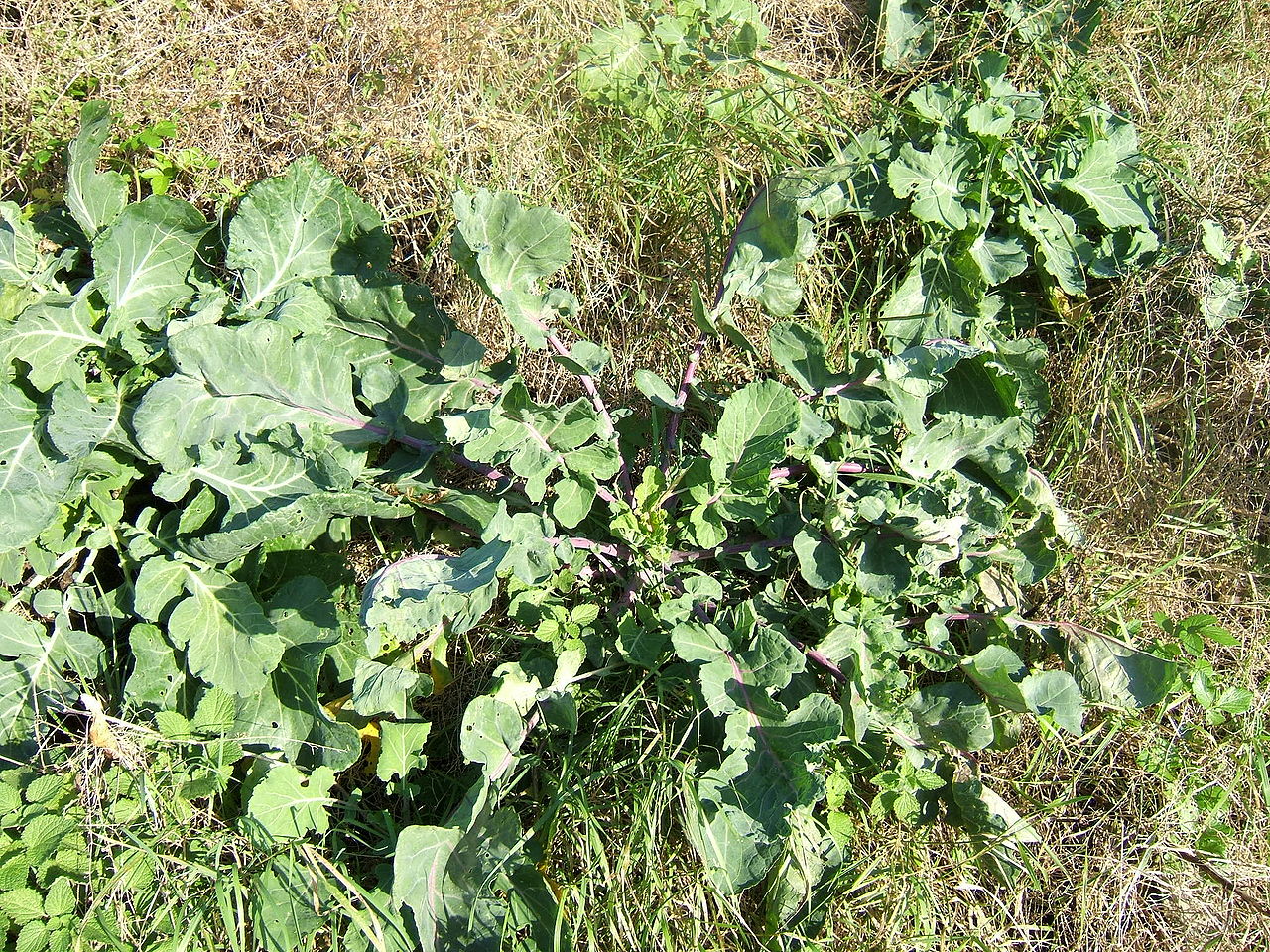Brassica oleracea
Overview
| Genus | Brassica |
| Species | oleracea |
| Common Name | Cabbage (CC-genome) |
| Abbreviation | B. oleracea |
| Ploidy | Diploid |
| Chromosome Number | 2n=2x=18, CC |
| Genome Size | 581 Mb |
| Genome Assemblies | 28 |
| Cross Reference | NCBI taxon: 3712 |
Organism Image

Description
Brassica oleracea is a plant species from family Brassicaceae that includes many common cultivars used as vegetables, such as cabbage, broccoli, cauliflower, kale, Brussels sprouts, collard greens, Savoy cabbage, kohlrabi, and gai lan. Its uncultivated form, wild cabbage, native to coastal southern and western Europe, is a hardy plant with high tolerance for salt and lime. However, its intolerance of competition from other plants typically restricts its natural occurrence to limestone sea cliffs, like the chalk cliffs on both sides of the English Channel. Wild B. oleracea is a tall biennial plant that forms a stout rosette of large leaves in the first year. The leaves are fleshier and thicker than other Brassica species—an adaptation that helps it store water and nutrients in its difficult growing environment. In its second year, it uses the stored nutrients to produce a flower spike 1 to 2 metres (3–7 ft) tall with numerous yellow flowers. A 2021 study suggested that the Eastern Mediterranean Brassica cretica was the origin of domesticated B. oleracea. Genetic analysis of nine wild populations on the French Atlantic coast indicated their common feral origin, deriving from domesticated plants escaped from fields and gardens.
Whole Genomes
Whole Genome Sequences & Annotations for Brassica oleracea
S genes
Brassica oleracea ASM3463897v1 S genes
| Query | Chromosome | Size(bp) | Coordinates | BLASTp Hit | BLASTp %ID |
| SRK | CM068153.1 | 56303276 | 38584351-38585608,38584046-38584306,38583932-38584022,38583621-38583879,38583315-38583538,38583076-38583226,38582690-38582998 | SRKb|AB052756.1_prot_BAB40987.1 | 36.45 |
| SCR | CM068153.1 | 56303276 | 37825101-37825170,37825269-37825483 | XP_018438641.1 | 87.67 |
Downloads
The Brassica oleracea S gene sequences are available in FASTA format.
| CDS and Protein (FASTA file) | S-gene_Brassica_oleracea |
Publications
Liu S, Liu Y, Yang X, Tong C, Edwards D, Parkin IA, Zhao M, Ma J, Yu J, Huang S, Wang X, Wang J, Lu K, Fang Z, Bancroft I, Yang TJ, Hu Q, Wang X, Yue Z, Li H, Yang L, Wu J, Zhou Q, Wang W, King GJ, Pires JC, Lu C, Wu Z, Sampath P, Wang Z, Guo H, Pan S, Yang L, Min J, Zhang D, Jin D, Li W, Belcram H, Tu J, Guan M, Qi C, Du D, Li J, Jiang L, Batley J, Sharpe AG, Park BS, Ruperao P, Cheng F, Waminal NE, Huang Y, Dong C, Wang L, Li J, Hu Z, Zhuang M, Huang Y, Huang J, Shi J, Mei D, Liu J, Lee TH, Wang J, Jin H, Li Z, Li X, Zhang J, Xiao L, Zhou Y, Liu Z, Liu X, Qin R, Tang X, Liu W, Wang Y, Zhang Y, Lee J, Kim HH, Denoeud F, Xu X, Liang X, Hua W, Wang X, Wang J, Chalhoub B, Paterson AH. The Brassica oleracea genome reveals the asymmetrical evolution of polyploid genomes. Nat Commun. 2014 May 23;5:3930. doi: 10.1038/ncomms4930.
Belser C, Istace B, Denis E, Dubarry M, Baurens FC, Falentin C, Genete M, Berrabah W, Chèvre AM, Delourme R, Deniot G, Denoeud F, Duffé P, Engelen S, Lemainque A, Manzanares-Dauleux M, Martin G, Morice J, Noel B, Vekemans X, D'Hont A, Rousseau-Gueutin M, Barbe V, Cruaud C, Wincker P, Aury JM. Chromosome-scale assemblies of plant genomes using nanopore long reads and optical maps. Nat Plants. 2018 Nov;4(11):879-887. doi: 10.1038/s41477-018-0289-4.
Sun D, Wang C, Zhang X, Zhang W, Jiang H, Yao X, Liu L, Wen Z, Niu G, Shan X. Draft genome sequence of cauliflower (Brassica oleracea L. var. botrytis) provides new insights into the C genome in Brassica species. Hortic Res. 2019 Jul 1;6:82. doi: 10.1038/s41438-019-0164-0.
Li X, Wang Y, Cai C, Ji J, Han F, Zhang L, Chen S, Zhang L, Yang Y, Tang Q, Bucher J, Wang X, Yang L, Zhuang M, Zhang K, Lv H, Bonnema G, Zhang Y, Cheng F. Large-scale gene expression alterations introduced by structural variation drive morphotype diversification in Brassica oleracea. Nat Genet. 2024 Mar;56(3):517-529. doi: 10.1038/s41588-024-01655-4.